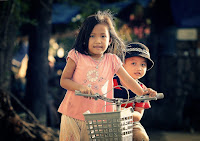- Thinking skills
- Research skills
- Communication skills
- Social skills
- Self-management skills
When I lead a workshop I'm often asked if these skills should be taught explicitly or should be part of the "hidden curriculum". I've always found it useful to name both the general categories and also the sub-skills of each category so that children will learn to identify these words with what they are doing and with the feedback they receive. As teachers we do need to explicitly design inquiries to foster the development of these skills, and we will also notice these skills being applied in the everyday life of the classroom and through play.
Both the IB learner profile and the approaches to learning should encourage the development of self-regulated learners. These learners:
- set their own learning goals and demonstrate persistence in working towards them
- ask questions and express their wonderings
- try out different strategies
- self-assess as they learn, and self-adjust their learning process
- reflect on their learning
As teachers we plan inquiries that will help develop and support all these skills. Planned learning experiences may well focus on the thinking and research skills, while play will help develop communication, social and self-management skills. Let's have a look at some examples of how the ATLs can also connect to the learner profile.
Thinking skills - careful observation and synthesising new understandings by seeing relationships and connections will help learners develop as inquirers and thinkers. Organising information, evaluating evidence and testing generalisations and ideas can help students to become principled and balanced.
Research skills - gathering information from a variety of sources, using their senses to observe and notice details, and recording observations will help students to be inquirers and communicators. Sorting and categorising information will develop knowledgeable learners.
Communication skills - listening respectfully and actively to others' ideas will show that students are caring. Expressing themselves using words and sentences will show that students are communicators. Documenting information and observations in a variety of ways will encourage learners to be both knowledgeable and communicators.
Social skills - listening carefully to others, being respectful, showing empathy, sharing and taking turns, and helping others will all encourage students to be caring and open minded. Being aware of their own and others' feelings, managing anger and resolving conflict will help students to become reflective and principled.
Self-management skills - following classroom routines and sharing responsibility for decision making will encourage learners to be principled.
When discussing the ATL with Early Years teachers, we come back again and again to the importance of the learning environment, which enables the children to co-construct knowledge and skills with their peers. A supportive environment will give opportunities for risk-taking and will allow for error-making that will support growth.
The ATL skills should therefore be seamlessly integrated into all learning experiences, rather than being taught as separate discrete skills. We should be creating the opportunities for these skills to develop, and we should map them across the curriculum as part of the planning process. Children will become proficient in a skill when they are given multiple opportunities to practice it. Of course if a skill is being introduced for the first time, then educators should model it and provide scaffolds, however it is by observing and listening to the students using these skills naturally through play that teachers can create additional opportunities for further practice and transfer of the skills.
The Approaches to Learning continue through the PYP and later into the MYP, DP and CP. However it is important to recognise that the foundations for developing these skills begin in the Early Years.
Photo Credit: Jess Foami on Pixabay

No comments:
Post a Comment